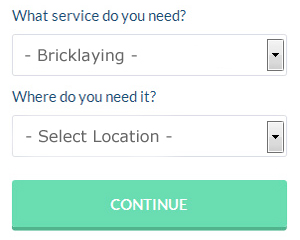Bricklayers Banks (PR9): When considering home improvements that involve any form of brickwork the conventional strategy would be to contact a qualified bricklayer in Banks. There will be very few Banks property owners who'll be equipped with the essential skills necessary to undertake this sort of work in a confident and satisfactory manner, and consequently employing a specialist is undoubtedly a smart decision in most situations.
You shouldn't be tempted to scrimp with your construction work around the home and garden by believing that bricklaying is a straightforward job. The reality is that there are lots of subtleties and trade secrets which ought to be learned by an amateur DIYer before thinking about taking on even a modest brickwork project like a fireplace for instance.
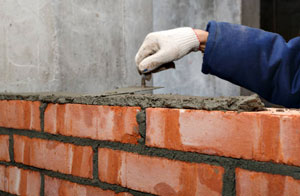
He will additionally be familiar with such things that us unqualified amateurs would perhaps not really think of, like thermal insulation properties of different varieties of bricks, humidity regulation, water runoff and ways to avoid water leakage. All of these points are particularly essential for external building and conservatory walls in Banks and the appropriate size footings are a must for all building jobs. Too narrow or not deep enough and the brickwork is in danger of being unbalanced and toppling over.
As he almost certainly won't be informed about all of this sort of stuff, the average amateur "bricklayer" in Banks will most likely produce poor quality work that isn't what you want at all. An accredited tradesperson will consider all scenarios and will not even have to think twice about just what is the optimal way to undertake any specific bricklaying task. Simply taking on just any "cowboy" bricklayer is never a good plan, as you really need to get an individual you are able to have faith in for this type of work. Be willing to pay a fair price and hire a certified tradesperson and you'll not be sorry in the end.
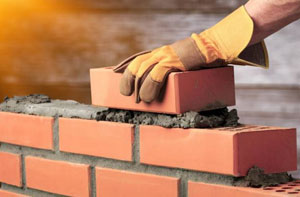
You will find that certified bricklayers in Banks have received all the required training to carry out your brickwork in the recommended way while adhering to the latest health and safety rules and should be kitted out with all of the required equipment and tools needed for the task. This means you can sit back and watch while your brickwork project takes shape, in a relaxed manner.
Expert Banks bricklayers will probably have gone through rigorous training to reach their current standard. This may perhaps have included starting as an apprentice bricklayer, going to a local college once a week, getting day to day experience on site, and eventually taking exams to achieve the necessary qualifications (City & Guilds or NVQ's). Prior to any work commencing they will pay a visit to your property to assess what exactly is needed, show you examples of work they've previously accomplished, set your mind at rest by offering guarantees for all work undertaken, and provide you with an estimate for any work discussed.
Essential to construction, bricklayers are responsible for creating the main foundation and structure of buildings. To be a bricklayer, having a keen eye for detail and the ability to accurately follow architectural blueprints and plans is necessary. Individuals pursuing the physically demanding job of bricklaying need to possess physical strength, stamina and dexterity.
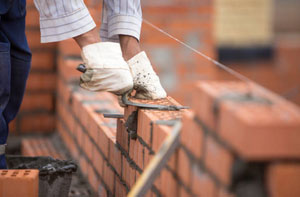
The process of laying bricks entails several key steps that must be followed. The work area must first be prepared by bricklayers, which involves levelling and cleaning the surfaces where the bricks are going to be laid. Mixing mortar, a combination of water, sand and cement, is a necessary task for bricklayers to hold the bricks in place. The bricks are laid one by one, with each brick carefully placed and leveled to ensure a stable and straight structure. Precision and skill are required of bricklayers to cut bricks to fit into confined spaces.
Bricklaying, though a skilled trade, poses certain risks. Harmful materials, which include dust and chemicals from the mortar, have the potential to cause respiratory problems for bricklayers. Bricklayers working at heights on scaffolding or ladders may be at risk of falls and injury. Bricklayers can minimise these risks by adhering to strict safety regulations and wearing protective gear, such as safety glasses, gloves and hard hats.
When you're trying to find a local Banks bricklayer, it should be seen as an added bonus if you can find one who is associated with a professional trade body, such as the British Standard Institution (BSI), the Fair Trade Association, the National Federation of Builders, the Guild of Builders and Contractors or the Federation of Master Builders. Having such an affiliation should confirm your confidence in your choice of bricklayer, and verify that they do actually have the necessary experience and qualifications. It also provides you with a resource for complaint, should they mess up.
Bricklaying can be carried out in Banks and also in nearby places like: Marshside, Mere Brow, Bretherton, Crossens, Much Hoole, Holmeswood, Sollom, Hundred End, Hesketh Bank, Shirdley Hill, Hall Green, and in these postcodes PR9 8EL, PR9 8HJ, PR9 8HD, PR4 6EG, PR9 8JQ, PR9 8EJ, PR9 8AU, PR9 8FH, PR9 8BA, PR9 8FN. Locally based Banks bricklayers will most likely have the phone code 01704 and the postcode PR9. Checking this can guarantee you access locally based bricklayers. Banks property owners will be able to benefit from these and many other comparable services.
Ashlar Walling Banks
Finely dressed stones, laid in regular courses, define the construction technique known as ashlar walling. This method is noted for its precision, with each stone cut to a uniform size and shape, ensuring a tight fit and minimal use of mortar. The resulting walls are not only aesthetically pleasing but also structurally robust. The use of ashlar masonry dates back to ancient times, evident in many historical buildings and monuments, demonstrating its lasting appeal and functionality.
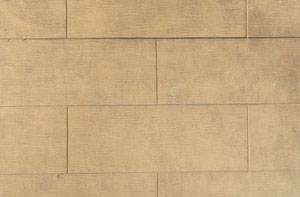
Creating ashlar walls requires meticulous planning and skilled craftsmanship. Stones are carefully chosen and dressed to achieve a smooth surface and exact dimensions. This precision reduces the need for mortar, resulting in a seamless and durable wall. The technique is frequently used in constructing important edifices such as temples, churches, and castles, where strength and beauty are essential.
Ashlar walls are like works of art that you can use in buildings! They're still popular today because they're both stylish and strong. Builders use them to restore old buildings in Banks and create brand new ones. The classic look of ashlar walls goes perfectly with modern designs, which shows how much people love them. We've got all sorts of new building materials now, but ashlar walls are special because they're made with a lot of skill. They show how you can build something that works well and looks amazing at the same time. (Ashlar Walling Banks)
Stonemasons
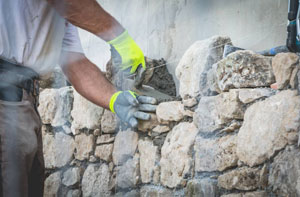
The installation and shaping of natural stones rather than man-made ones is referred to as stonemasonry, and in many ways it's comparable to bricklaying. Practiced as a trade for hundreds (if not thousands) of years, stonecraft or stonemasonry is one of the oldest professions of man. Nowadays, Banks stonemasons concentrate mostly on the restoration, repair and preservation or stone structures such as buildings, statues, churches and bridges. If your property in Banks is built with stone rather than brick, you might have to speak to a local stonemason in Banks, if you have repair or remodeling work that needs looking at. Although stonemasonry is an incredibly skilled profession there aren't any formal qualifications needed to get into the trade. This is just one of those vocations where would be craftsmen master their skills "on-the-job" and practical experience is crucial. Once trained, stonemasons will normally filter into one of the two principal sectors of the trade and become either banker stonemasons or fixer stonemasons, with fixer stonemasons working primarily on-site and banker stonemasons plying their trade in a workshop environment.
Chimney Renovation
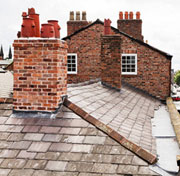
It is always a wise idea to keep a close eye on the condition of your chimney, because it is continually exposed to all different weather conditions and is prone to damage. Keeping abreast of this situation will allow you to avoid expensive reconstruction down the line. Maintenance chores that regularly need doing on chimney stacks include things like; sealing up unused chimneys and flues, repairs to flashing, securing or replacing cowls and pots, or mortar re-pointing. All things like this can be performed by your helpful local bricklayer. (Tags: Chimney Re-Building Banks, Chimney Maintenance Banks, Chimney Repairs Banks)
RSJ Installation Banks
Installing RSJ steel support beam is an activity that's undertaken when a new house is being built or where structural alterations are being done on an existing property in Banks - particularly if a load-bearing wall is going to be taken out. Most Banks bricklayers will be willing to help you out with this and will come armed with the required know-how to do this task safely.
Given that building regulations approval will need to be obtained, it will be imperative to seek assistance from a structural engineer, and a fully qualified bricklayer or builder hired to install the RSJ. As the overall stability of the building will be negatively affected by an erroneous RSJ installation, the likelihood of a collapse is a constant threat, and in some instances serious injuries or maybe even fatalities a distinct possibility.
What do the initials RSJ stand for? - Rolled Steel Joist.
Bricklaying Courses

If you would simply like to to master a few basic bricklaying skills so that you can do a few jobs around the house, there are often courses out there in local colleges and schools and through private training classes in the Banks area. If there are not any courses on offer locally, you might have to travel further afield to find one. As an illustration, a basic City & Guilds Bricklaying Course (Level 1) could be done in an intensive three week course in which you will master • Health and Safety in construction, • Building a half-brick corner, • Construction of cavity walls in brick and block, • Building brick walling (English bond), or you might be able to take evening classes which would of course take longer than three weeks. An outlay of approximately £1500 will very likely be needed to secure a course like this.
Garden Walls
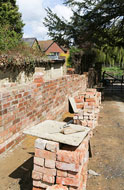
Of all the jobs that Banks bricklayers are asked to do, building a garden wall is probably one of the most commonplace. A correctly built garden wall is beneficial for anyone's garden and has the advantage of being better looking, longer lived and tougher than garden fencing. A brick garden wall can serve many purposes aside from simply dividing your property from a neighbours or establishing the perimeter between your garden and a public road or pathway. It can additionally be used to support a raised planting bed, to provide a dedicated area for refuse and recycling bins, to form terracing on steep slopes, to contain a compost heap, to retain a soil bank, to house a barbecue or to establish a division between a lawn and a patio area. If you're to finish up with a straight, sturdy and safe garden wall, the most critical factor is the foundation, which must be no less than 100mm deep by 300mm wide (150mm x 450mm in the case of retaining walls) and made out of concrete. (Tags: Garden Walls Banks, Brick Walls Banks, Garden Wall Builders Banks, Boundary Walls Banks).
Brick and Flint Walls

An attractive alternative to a standard brick wall, a brick and knapped flint wall could be an impressive option for your boundary or garden wall in Banks. It is definitely worth thinking about if you are looking for a wall in Banks that stands out from the rest, and you'd be in decent company, since flint has been employed in all sorts of building projects since Roman times.
So as to add a bit of colour and character, most brick and flint walls feature a brick surrounding with flint panels. Not surprisingly this sort of wall is more widespread in places where flint is abundant, but can be built anyplace provided that a decent supply of flint can be obtained.
Before hiring a tradesman for this kind of work, always ask to see images of walls that they have previously built, because not all bricklayers in Banks will have been trained in the specialist methods which are needed for constructing brick and flint walls. (Tags: Knapped Flint Walls Banks, Brick and Flint Walls Banks, Brick and Flint Boundary Walls Banks).
Brickwork Repointing
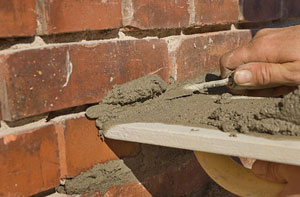
You might not just need a bricklayer for constructing new brickwork in Banks, you could also need one for repairing worn and damaged walls as with repointing. Mortar joints are liable to break down or become weakened when they've been exposed to extreme weather conditions for a number of years. The practice of scraping out and repairing these impaired joints with new mortar is known as re-pointing. When your property in Banks needs a bit of re-pointing done on it, it is wise to bring in a professional bricklayer to complete the job. Being sure that anybody who deals with your re-pointing knows exactly what they are up to is important, as badly repointed brickwork is going to look horrible. Brick repointing services are also available in Marshside, Mere Brow, Bretherton, Crossens, Much Hoole, Holmeswood, Sollom, Hundred End, Hesketh Bank, Shirdley Hill, Hall Green, and and of course in Banks itself.
Brick Buttresses
A buttress is a wall that's built to afford lateral support to another wall perpendicular to it, with support being provided from the bottom to the top of the wall. Whilst a buttress can be functional, decorative or both of those things, it's main intention is one of strengthening.
For householders in Banks with high boundary walls, it may be necessary to build brick buttresses at some point, for extra strength and support. With the passing of time, taller walls can be impacted by strong winds and subsidence, and might be at risk of falling over. The person to call if you've got problem walls is your friendly Banks bricklayer, who will be pleased to build you some robust brick buttresses to bolster your walls and stop potential accidents.
Mortar Joint Profiles
Among the various types of mortar joint that are employed in brickwork and stonemasonry, the most common ones are the gravevine joint, the flush joint, the recessed joint, the weather struck joint, the beaded joint, the bucket handle joint (or concave), the vee joint and the concave joint. The most frequently used mortar joint in the United Kingdom is the bucket handle (or concave joint), whereby the exposed face of the joint is compressed forming the most hard-wearing profile you can get.
To Summarize
Bricklaying is one of the key trades within the construction industry and is very important in the segment relating to house building. A bricklayers work features laying masonry, blocks and bricks in mortar, for the repair or construction of arches, tunnels, chimney stacks, partitions, walls, footings and other brickwork structures. You'll find them working next to other construction tradesmen, alone or in bricklaying gangs, on alterations, commercial building projects, housing developments, restorations and extensions.
Bricklaying Tasks Banks

Banks bricklayers will likely help you with brick piers in Banks, stone cladding, glass blockwork, ornamental garden brickwork, blockwork in Banks, masonry, block paving Banks, serpentine walls in Banks, brick barbecues Banks, commercial bricklaying, brick fireplaces, brick garages Banks, brick paths, curved brick walls, structural alterations, cornice brickwork in Banks, brickwork chimneys, honeycomb sleeper walls, architectural bricklaying Banks, house building, brick and flint walls, brickwork restoration Banks, laying padstones, brick cleaning in Banks, brickwork columns, brick repointing in Banks, brick walls, Ashlar walls, brick driveways in Banks, installing cavity trays, radius walls, brick walkways, brick bay windows, decorative parapets, brick house extensions and other bricklaying tasks in Banks, Lancashire. These are just a small portion of the tasks that are carried out by local bricklayers. Banks providers will let you know their entire range of services.
Bricklaying Services Banks
- Stonemasonry
- Block Paving
- Bricklayer
- Brick Chimneys
- Stone Cladding
- Brickwork Contractors
- Brick Cleaning
- Bricklaying
- Brick Arches
- Garden Walls
- Brick Fireplaces
- Blockwork
- Brick Barbecues
- Brick Garages
 More Banks Trades: Banks home improvements generally require the skills of many different tradesmen, and despite the fact that you are currently interested in a bricklayer in Banks, a building contractor in Banks, SKIP HIRE in Banks, a heating engineer in Banks, a window fitter in Banks, a kitchen specialist in Banks, a carpenter in Banks, an odd job man in Banks, a painter & decorator in Banks, a carpet fitter in Banks, a tiler in Banks, gutter installation in Banks, an electrician in Banks, a plasterer in Banks, loft conversion in Banks, a metalworker in Banks, a stonemason in Banks, a cleaner in Banks, waste removal in Banks, a scaffolder in Banks, might also be required at some point during your project.
More Banks Trades: Banks home improvements generally require the skills of many different tradesmen, and despite the fact that you are currently interested in a bricklayer in Banks, a building contractor in Banks, SKIP HIRE in Banks, a heating engineer in Banks, a window fitter in Banks, a kitchen specialist in Banks, a carpenter in Banks, an odd job man in Banks, a painter & decorator in Banks, a carpet fitter in Banks, a tiler in Banks, gutter installation in Banks, an electrician in Banks, a plasterer in Banks, loft conversion in Banks, a metalworker in Banks, a stonemason in Banks, a cleaner in Banks, waste removal in Banks, a scaffolder in Banks, might also be required at some point during your project.
 Bricklayers Banks
Bricklayers Banks Repointing Banks
Repointing Banks Bricklayer Banks
Bricklayer BanksIf you're interested in local Banks info click here
Bricklayers Near Banks
Also find: Mere Brow bricklayers, Shirdley Hill bricklayers, Bretherton bricklayers, Crossens bricklayers, Holmeswood bricklayers, Hundred End bricklayers, Hall Green bricklayers, Hesketh Bank bricklayers, Sollom bricklayers, Much Hoole bricklayers, Marshside bricklayers and more. Most of these areas are catered for by local bricklayers. Banks property owners can get bricklaying quotations by going here.
Bricklayers in PR9 area, (dialling code 01704).
Garden Walls Banks - Repointing Banks - Brickwork Repairs Banks - Bricklayers Banks - Bricklaying Banks - Masonry Work Banks - Bricklayers Near Me - Bricklayer Banks - Stonework Banks




